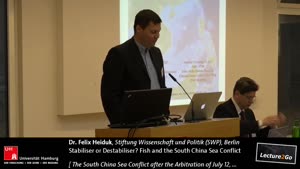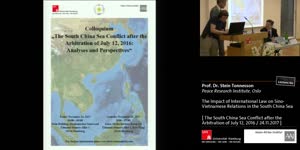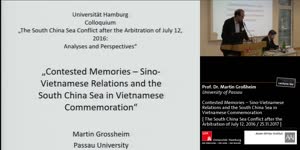Stabiliser or Destabiliser? Fish and the South China Sea Conflict - Dr. Felix Heiduk - Universität Hamburg
- Lecture2Go
- Videokatalog
- F.5 - Geisteswissenschaften
- Asien-Afrika-Institut
- The South China Sea Conflict after the Arbitration of July 12, 2016: Analyses and Perspectives
Videokatalog
Stabiliser or Destabiliser? Fish and the South China Sea Conflict
Fish, or the hunger for fish to be precise, is an underappreciated source of tension in the South China
Sea. Clashes in the South China Sea have actually more often than not involved fishing vessels rather
than navy frigates or submarines. It is especially China’s growing hunger for fish, coupled with the
severe depletion of fish in its sovereign waters due to decades of drastic overfishing, which has pushed
its neighbors towards new and assertive methods of maritime protection. Indonesia, for instance, has
increased its vigilance and protection of its maritime fishing industry in a numerous public display of
retribution against poachers by blowing up their vessels. Recent clashes in the South China Sea have
produced few casualties thus far, yet the number of clashes is creeping up steadily. As a result, insecurity,
mistrust and uncertainty have been on the rise in the region.
On the other hand, joint fisheries agreements, often including elements such as the clear demarcation of
fishing grounds, joint fishing moratoriums and joint coast guard patrols, have been signed bilaterally
between for example Vietnam and China (for the Gulf of Tonkin) or Taiwan and the Philippines. Thus
contributing significantly to the management of manifest conflicts. The paper therefore seeks to explore
the potential of fish as a potential destabilizing factor as well as its potential for a better conflict
management via a multilateral management of fish stocks in the South China Sea.









